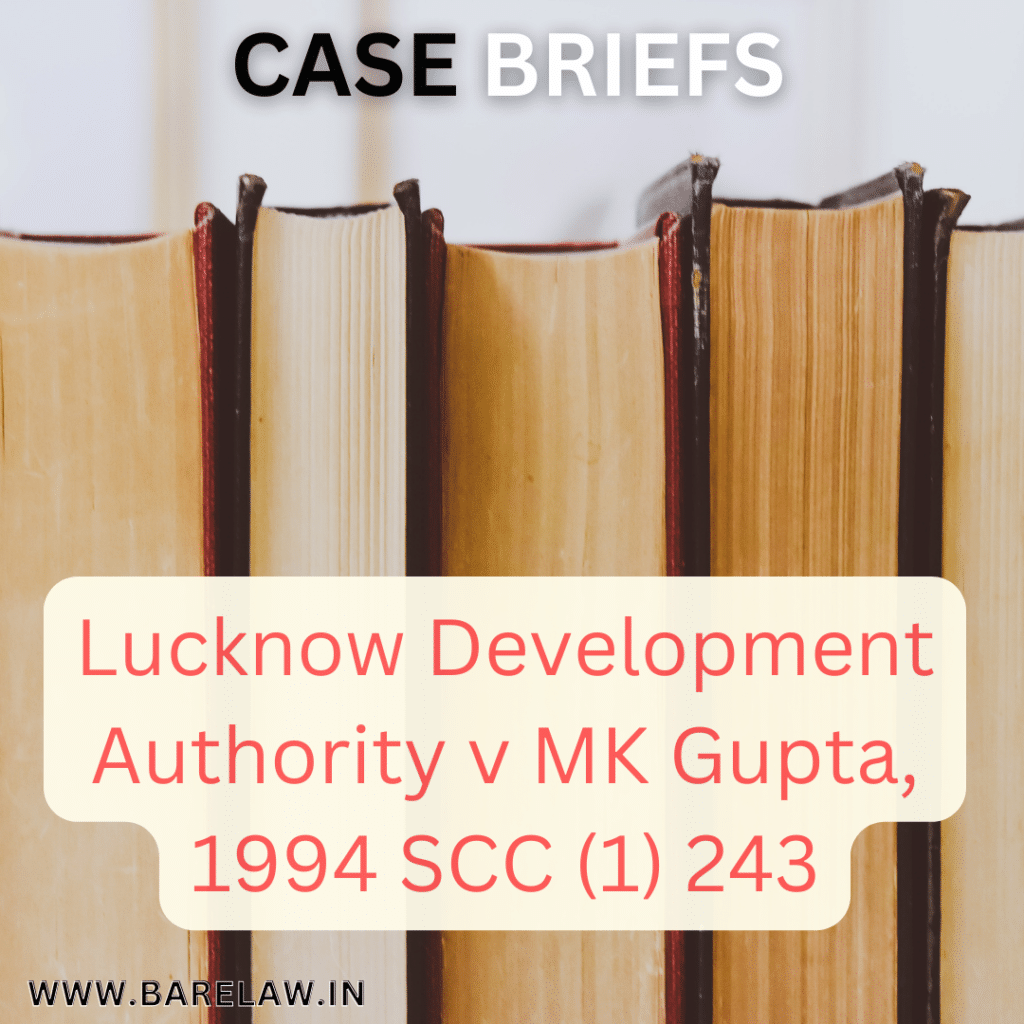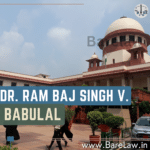
Lucknow Development Authority v MK Gupta, 1994 SCC (1) 243
Table of Contents
| Case Name | Lucknow Development Authority v. M.K. Gupta |
| Citation | (1994) SCC (1) 243 |
| Court | Supreme Court of India |
| Date of Judgment | 19th October, 1993 |
| Bench | J.S. Verma, M.N. Venkatachaliah, G.N. Ray, S.P. Bharucha, A.M. Ahmadi, JJ. |
| Parties Involved | Appellant: Lucknow Development Authority Respondent: M.K. Gupta |
Background:
The Lucknow Development Authority (LDA) had allotted a plot of land to M.K. Gupta (the respondent) for construction of a petrol pump. The allotment was made on the condition that the construction should be completed within a stipulated time period. However, M.K. Gupta failed to complete the construction within the given time period, and LDA terminated the allotment and forfeited the deposit.
M.K. Gupta challenged the termination and forfeiture in the High Court of Allahabad, which directed the LDA to reconsider the matter. The LDA again terminated the allotment and forfeited the deposit. M.K. Gupta then filed a writ petition in the High Court, which quashed the termination and forfeiture. The LDA appealed to the Supreme Court against the High Court’s order.
Issue:
- Whether the High Court had the power to interfere with the decision of the LDA to terminate the allotment and forfeit the deposit?
- Whether the termination of allotment and forfeiture of deposit was justified in the present case?
Judgment:
The Supreme Court held that the High Court had the power to interfere with the decision of the LDA to terminate the allotment and forfeit the deposit. The Court observed that the power of judicial review is an integral part of the Indian Constitution and the High Court has the power to review administrative actions.
However, the Court also held that the termination of allotment and forfeiture of deposit was justified in the present case. The Court observed that the conditions of allotment were clear and unambiguous, and M.K. Gupta had failed to complete the construction within the stipulated time period. Therefore, the LDA was within its rights to terminate the allotment and forfeit the deposit.
The Court also observed that the High Court had erred in interfering with the decision of the LDA without considering the factual and legal aspects of the case. The Court set aside the High Court’s order and upheld the termination of allotment and forfeiture of deposit.
Conclusion:
The Lucknow Development Authority v. M.K. Gupta case is an important judgment in the field of administrative law. It reinforces the power of judicial review and emphasizes the importance of adherence to the terms and conditions of allotment.
The Supreme Court held that the High Court had the power to interfere with the decision of the LDA to terminate the allotment and forfeit the deposit. The Court observed that the power of judicial review is an integral part of the Indian Constitution and the High Court has the power to review administrative actions.
However, the Court also held that the termination of allotment and forfeiture of deposit was justified in the present case. The Court observed that the conditions of allotment were clear and unambiguous, and M.K. Gupta had failed to complete the construction within the stipulated time period. Therefore, the LDA was within its rights to terminate the allotment and forfeit the deposit.
The Court also observed that the High Court had erred in interfering with the decision of the LDA without considering the factual and legal aspects of the case. The Court set aside the High Court’s order and upheld the termination of allotment and forfeiture of deposit.
Also read, similar content- https://iritm.indianrailways.gov.in/instt/uploads/files/1436166675075-Lucknow%20Development%20Authority%20v.%20M.K.%20Gupta.pdf





